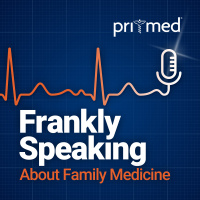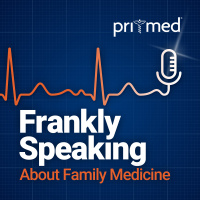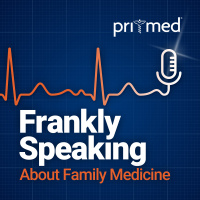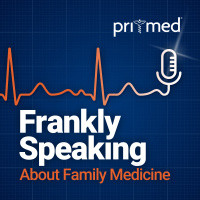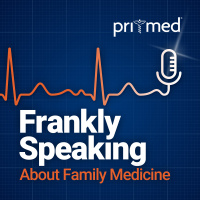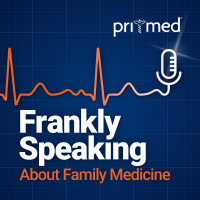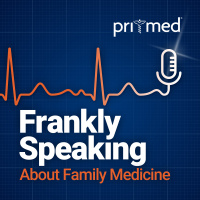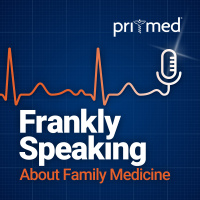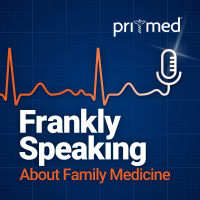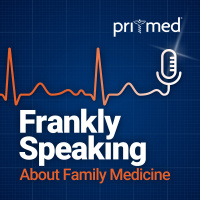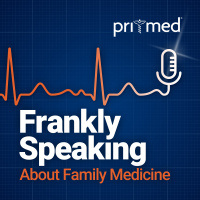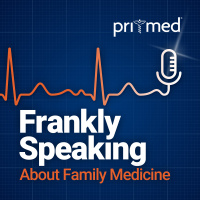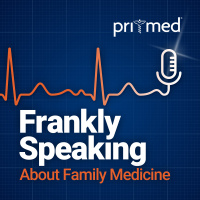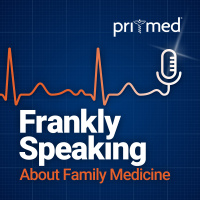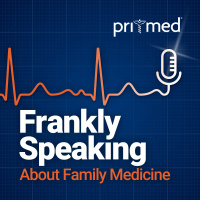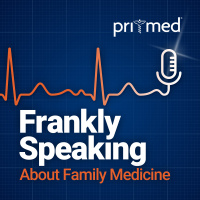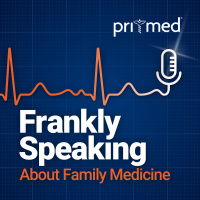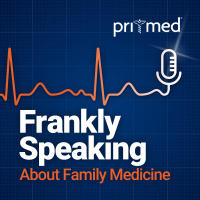Synopsis
A weekly podcast series, hosted by Frank Domino, MD, covering newsworthy topics and patient-focused best practices in Family Medicine.
Episodes
-
Using DOACs for Valvular Atrial Fibrillation - Frankly Speaking Ep 249
08/11/2021 Duration: 10minCredits: 0.25 AMA PRA Category 1 Credit™ CME/CE Information and Claim Credit: https://www.pri-med.com/online-education/podcast/frankly-speaking-cme-249 Overview: For non-valvular atrial fibrillation, physicians, patients, and guideline organizations all prefer direct oral anticoagulants (DOACs) over vitamin K antagonists, such as warfarin, for thromboembolic prophylaxis. For those with valvular atrial fibrillation, the data for safety and efficacy have been limited because randomized trials comparing DOACs to warfarin often exclude patients with valvular atrial fibrillation. Join us to explore new data that shed light on the use of DOACs in valvular atrial fibrillation. Episode resource links: Dawwas GK, Dietrich E, Cuker A, Barnes GD, Leonard CE, Lewis JD. Effectiveness and Safety of Direct Oral Anticoagulants Versus Warfarin in Patients With Valvular Atrial Fibrillation : A Population-Based Cohort Study. Ann Intern Med. 2021;174(7):910-919. Guest: Alan Ehrlich MD, FAAFP Music Cr
-
Aspirin—Not Really for Primary Prevention - Frankly Speaking Ep 248
01/11/2021 Duration: 08minCredits: 0.25 AMA PRA Category 1 Credit™ CME/CE Information and Claim Credit: https://www.pri-med.com/online-education/podcast/frankly-speaking-cme-248 Overview: Join us to hear a discussion on the important changes the AHA/ACC and USPSTF have made to their positions on the use of aspirin for primary prevention of cardiovascular disease. The organizations note that while aspirin for primary prevention lowers the risk of a myocardial infarction, its harmful effects may outweigh its benefits. Learn the aspirin recommendations for your patients in their 40s, 50s, and 60s who are at higher risk for a cardiovascular event. Episode resource links: New: https://www.uspreventiveservicestaskforce.org/uspstf/draft-recommendation/aspirin-use-to-prevent-cardiovascular-disease-preventive-medication Old: https://www.aafp.org/afp/2016/1015/od1.html https://www.uspreventiveservicestaskforce.org/uspstf/document/RecommendationStatementFinal/aspirin-to-prevent-cardiovascular-disease-and-cancer Guest: Ji
-
A Fishy Method to Prevent Migraines - Frankly Speaking Ep 247
26/10/2021 Duration: 10minCredits: 0.25 AMA PRA Category 1 Credit™ CME/CE Information and Claim Credit: https://www.pri-med.com/online-education/podcast/frankly-speaking-cme-247 Overview: When it comes to chronic migraines, your first-line prevention is probably medication, but according to a new study, it may not have to be. Certain foods may play a role in increasing and decreasing migraine recurrence. Join us to review a recent randomized controlled trial aimed at preventing migraines in those with chronic migraines. Episode resource links: BMJ 2021; 374 :n1448 doi:10.1136/bmj.n1448; doi: https://doi.org/10.1136/bmj.n1448 The association of dietary patterns with migraine attack frequency in migrainous women. Nutritional Neuroscience 23:9, pages 724-730 Guest: Alan Ehrlich MD, FAAFP Music Credit: Richard Onorato
-
Muscle Relaxants for Low Back Pain: Are They Worth the Risk? - Frankly Speaking Ep 246
18/10/2021 Duration: 09minCredits: 0.25 AMA PRA Category 1 Credit™ CME/CE Information and Claim Credit: https://www.pri-med.com/online-education/podcast/frankly-speaking-cme-246 Overview: Low back pain often leads to disability and loss of income and is a significant burden on patients and the healthcare system. While muscle relaxants are the third most common prescribed drugs in the treatment of low back pain, recent data demonstrating its use and efficacy are limited. This session discusses a recent systematic review of the safety, efficacy, and accepted use of muscle relaxants in the treatment of low back pain. Don’t miss this opportunity to learn how to provide low back pain treatments that have clear benefits for your patients. Episode resource links: Cashin A G, Folly T, Bagg M K, Wewege M A, Jones M D, Ferraro M C et al. Efficacy, acceptability, and safety of muscle relaxants for adults with non-specific low back pain: systematic review and meta-analysis BMJ 2021; 374 :n1446 doi:10.1136/bmj.n1446 https://pub
-
MRI for Elevated PSA - Frankly Speaking Ep 245
11/10/2021 Duration: 11minCredits: 0.25 AMA PRA Category 1 Credit™ CME/CE Information and Claim Credit: https://www.pri-med.com/online-education/podcast/frankly-speaking-cme-245 Overview: When your patient has an elevated screening PSA level, your first inclination may be to refer for a biopsy, but have you considered obtaining a pre-biopsy MRI? In this podcast, we will review the appropriate management for an elevated screening PSA. You’ll want to hear about the new benefit of obtaining a pre-biopsy MRI to guide diagnostic procedures. Episode resource links: NEJM July 9, 2021; DOI: 10.1056/NEJMoa2100852\ Urology 2016 Apr;90:32-7. doi: 10.1016/j.urology.2015.11.046 Guest: Frank J. Domino, MD Music Credit: Richard Onorato
-
Can Artificial Intelligence Predict and Prevent Suicide? - Frankly Speaking Ep 244
04/10/2021 Duration: 14minCredits: 0.25 AMA PRA Category 1 Credit™ CME/CE Information and Claim Credit: https://www.pri-med.com/online-education/podcast/frankly-speaking-cme-244 Overview: Suicide and attempted suicide are significant health issues affecting the United States and the world. Are you aware of the tools available to you that can support suicide prevention strategies and save lives? Don’t miss this session to learn about how the use of an electronic health record in a large health system may help predict suicide attempts. Episode resource links: Walsh CG, Johnson KB, Ripperger M, Sperry S, Harris J, Clark N, Fielstein E, Novak L, Robinson K, Stead WW. Prospective Validation of an Electronic Health Record-Based, Real-Time Suicide Risk Model. JAMA Netw Open. 2021 Mar 1;4(3):e211428. doi: 10.1001/jamanetworkopen.2021.1428. PMID: 33710291; PMCID: PMC7955273 doi: 10.1001/jamanetworkopen.2021.1428 Liang, Angela, and Paul Nestadt S . "Suicide Risk in the COVID-19 Pandemic." Johns Hopkins Psychiatry Guide,
-
“Can You Hear Me Now?”— Aging, Hearing Impairment, and Physical Function - Frankly Speaking Ep 243
27/09/2021 Duration: 10minCredits: 0.25 AMA PRA Category 1 Credit™ CME/CE Information and Claim Credit: https://www.pri-med.com/online-education/podcast/frankly-speaking-cme-243 Overview: Evidence strongly supports a correlation between hearing impairment in older adults and decline in physical functioning. A recent population cohort study of older adults revealed that hearing impairment was associated with poorer physical function, reduced walking endurance, and accelerated decline. Join us while we discuss this evidence and how to apply it to your practice. You’ll walk away with strategies to promote hearing assessment and to help optimize physical functioning in your older adult patients. Episode resource links: Brenowitz WD, Wallhagen MI. Does Hearing Impairment Affect Physical Function?: Current Evidence, Potential Mechanisms, and Future Research Directions for Healthy Aging. JAMA Netw Open. 2021 Jun 1;4(6):e2114782. doi: 10.1001/jamanetworkopen.2021.14782. PMID: 34170308. Martinez-Amezcua P, Powell D, Ku
-
Cutting Through the Fog: Recognizing Gluten-Induced Neurocognitive Impairment - Frankly Speaking Ep 242
20/09/2021 Duration: 11minCredits: 0.25 AMA PRA Category 1 Credit™ CME/CE Information and Claim Credit: https://www.pri-med.com/online-education/podcast/frankly-speaking-cme-242 Overview: Gluten exposure is known to cause a number of problems in both those with celiac disease and those with non-celiac gluten sensitivity. One aspect that has not received much attention from the research community is the neurocognitive impairment that can occur following gluten exposure in these individuals. Join us for this podcast to dive into a recent article that describes these effects. Episode resource links: Edwards George JB, Aideyan B, Yates K, et al. Gluten-induced Neurocognitive Impairment: Results of a Nationwide Study [published online ahead of print, 2021 May 28]. J Clin Gastroenterol. 2021 Guest: Alan Ehrlich MD, FAAFP Music Credit: Richard Onorato
-
Continuous Glucose Monitoring (CGM) for Type 2 Diabetes Mellitus (T2DM) - Frankly Speaking Ep 240
06/09/2021 Duration: 09minCredits: 0.25 AMA PRA Category 1 Credit™ CME/CE Information and Claim Credit: https://www.pri-med.com/online-education/podcast/frankly-speaking-cme-240 Overview: Have you considered continuous glucose monitoring (CGM) for your patients with suboptimally controlled type 2 diabetes mellitus (T2DM) on at least 3 injections of insulin per day? This session will give you the information you need to confidently initiate CGM in appropriate patients. You’ll walk away with a clear understanding of the different CGM options and the benefits and challenges of CGM. Episode resource links: Ida S, Kaneko R, Murata K. Utility of Real-Time and Retrospective Continuous Glucose Monitoring in Patients with Type 2 Diabetes Mellitus: A Meta-Analysis of Randomized Controlled Trials. J Diabetes Res. 2019 Jan 15;2019:4684815. doi: 10.1155/2019/4684815. PMID: 30775385; PMCID: PMC6350576. Maiorino et al. Diabetes Care. 2020;43:1146–1156 Guest: Jillian Joseph, MPAS, PA-C Music Credit: Richard Onorato
-
Update From the CDC: New Gonorrhea Guidelines - Frankly Speaking Ep 239
30/08/2021 Duration: 08minCredits: 0.25 AMA PRA Category 1 Credit™ CME/CE Information and Claim Credit: https://www.pri-med.com/online-education/podcast/frankly-speaking-cme-239 Overview: Join us to discuss the CDC’s new guidelines for the management of sexually transmitted infections due to Neisseria gonorrhoeae. You’ll walk away with recommendations for how to address urogenital, rectal, and pharyngeal infections. You’ll also discover alternative regimens for patients allergic to first-line therapy and understand how to manage coinfection with chlamydia. Episode resource links: St. Cyr S, Barbee L, Workowski KA, et al. Update to CDC’s Treatment Guidelines for Gonococcal Infection, 2020. MMWR Morb Mortal Wkly Rep 2020;69:1911–191 Guest: Alan Ehrlich MD, FAAFP Music Credit: Richard Onorato
-
Lung Cancer Screening—Expanded Recommendations! - Frankly Speaking Ep 238
23/08/2021 Duration: 11minCredits: 0.25 AMA PRA Category 1 Credit™ CME/CE Information and Claim Credit: https://www.pri-med.com/online-education/podcast/frankly-speaking-cme-238 Overview: Join us to discuss important changes in the 2021 USPSTF recommendation on lung cancer screening. Given lung cancer’s high prevalence and poor prognosis in later stages, it is important for primary care clinicians to know which patients to screen and what method to use. You’ll also learn the appropriate time to stop screening. Episode resource links: Screening for Lung Cancer US Preventive Services Task Force Recommendation Statement JAMA. 2021;325(10):962-970. doi:10.1001/jama.2021.1117 Guest: Robert A. Baldor MD, FAAFP Music Credit: Richard Onorato
-
Identifying Risk in Women to Prevent CVD - Frankly Speaking Ep 237
16/08/2021 Duration: 09minCredits: 0.25 AMA PRA Category 1 Credit™ CME/CE Information and Claim Credit: https://www.pri-med.com/online-education/podcast/frankly-speaking-cme-237 Overview: Solid evidence shows that adverse pregnancy outcomes (APOs) correlate with an increased risk of cardiovascular disease (CVD) in women. Evidence is also becoming clearer that lactation and breastfeeding may have CV protective benefits as well. Social determinants of health play a significant role in these diseases; facts support that Black, Hispanic and Asian American women suffer from worse pregnancy outcomes than White American women. Join us while we discuss the recent American Heart Association (AHA) guideline update regarding the association of increased risk of CVD and metabolic disease with APOs and what can be done to reduce these risks. Episode resource links: Adverse Pregnancy Outcomes and Cardiovascular Disease Risk: Unique Opportunities for Cardiovascular Disease Prevention in Women. Nisha I. Parikh, MD, MPH, Chair, Jua
-
Continuous Glucose Monitoring—What’s All the Hype? - Frankly Speaking Ep 236
09/08/2021 Duration: 10minCredits: 0.25 AMA PRA Category 1 Credit™ CME/CE Information and Claim Credit: https://www.pri-med.com/online-education/podcast/frankly-speaking-cme-236 Overview: Continuous glucose monitoring (CGM) for patients with diabetes has been available for several years now, but its utility in managing diabetes care is unclear. Join us to discuss the results of a systematic review examining the benefits of CGM for patients with both type 1 and type 2 diabetes mellitus. Episode resource links: Effects of continuous glucose monitoring on metrics of glycemic control in diabetes: a systematic review with meta-analysis of randomized controlled trials. Diabetes Care. 2020;43(5):1146-1156. Implementing Continuous Glucose Monitoring in Clinical Practice. www.aafp.org/fpm March/April 2021 Longo R, Sperling S. Personal versus professional continuous glucose monitoring: when to use which on whom. Diabetes Spectr. 2019;32(3):183-193. Guest: Robert A. Baldor MD, FAAFP Music Credit: Richa
-
Nasal Steroids for Perennial Allergic Rhinitis: Is PRN Use Enough? - Frankly Speaking Ep 235
02/08/2021 Duration: 08minCredits: 0.25 AMA PRA Category 1 Credit™ CME/CE Information and Claim Credit: https://www.pri-med.com/online-education/podcast/frankly-speaking-cme-235 Overview: Perennial allergic rhinitis affects both children and adults, and management includes both allergy avoidance as well as medication management. Intranasal steroids are the mainstay of treatment and have traditionally required consistent use, but new data are emerging. Find out the results of a new study evaluating PRN use as an alternative approach. Episode resource links: Thongngarm T, Wongsa C, Phinyo P, Assanasen P, Tantilipikorn P, Sompornrattanaphan M. As-Needed Versus Regular Use of Fluticasone Furoate Nasal Spray in Patients with Moderate to Severe, Persistent, Perennial Allergic Rhinitis: A Randomized Controlled Trial. J Allergy Clin Immunol Pract. 2021 Mar;9(3):1365-1373 Guest: Alan Ehrlich MD, FAAFP Music Credit: Richard Onorato
-
Shorter Antibiotic Duration for Outpatient Infections - Frankly Speaking Ep 234
26/07/2021 Duration: 09minCredits: 0.25 AMA PRA Category 1 Credit™ CME/CE Information and Claim Credit: https://www.pri-med.com/online-education/podcast/frankly-speaking-cme-234 Overview: Many providers overtreat outpatient infections for fear of not treating until resolution or causing a complication, but this can lead to antibiotic resistance and adverse events. Join us to discuss the new ACP guidelines on antibiotic use in the outpatient setting and the pediatric treatment recommendations. Walk away with a clear understanding of the guidelines for optimal duration of antibiotic treatment for individuals with an outpatient infection. Episode resource links: ACP: Ann Intern Med. doi:10.7326/M20-7355; https://www.acpjournals.org/doi/pdf/10.7326/M20-7355 Low risk for PCN allergy: Am J Respir Crit Care Med 2020 Feb 21; [e-pub]. (https://doi.org/10.1164/rccm.202001-0089LE); Mayo Clinic Proceedings 2018, 93 (1): 101-107 Guest: Robert A. Baldor MD, FAAFP Music Credit: Richard Onorato
-
Taking the Distress out of Diabetes—Mindfulness and Acceptance Therapies May Help - Frankly Speaking Ep 233
19/07/2021 Duration: 11minCredits: 0.25 AMA PRA Category 1 Credit™ CME/CE Information and Claim Credit: https://www.pri-med.com/online-education/podcast/frankly-speaking-cme-233 Overview: T2DM is an epidemic, and its impact on quantity of life is well documented. In most cases, treatment involves significant lifestyle changes in combination with medication. Distress about the T2DM diagnosis and necessary behavioral changes occurs in about one-third of people, and this distress is associated with poor glycemic management. Join us as we discuss a recent meta-analysis on mindfulness and learn how cognitive therapies may be effective in reducing distress and HbA1c. Episode resource links: Ngan, H.Y., Chong, Y.Y. and Chien, W.T. (2021), Effects of mindfulness‐ and acceptance‐based interventions on diabetes distress and glycaemic level in people with type 2 diabetes: Systematic review and meta‐analysis. Diabet Med, 38: e14525. https://doi.org/10.1111/dme.14525; https://onlinelibrary-wiley-com.umassmed.idm.oclc.org/doi/ep
-
Community-Acquired Pneumonia: How Long Do We Need to Treat? - Frankly Speaking Ep 232
12/07/2021 Duration: 10minCredits: 0.25 AMA PRA Category 1 Credit™ CME/CE Information and Claim Credit: https://www.pri-med.com/online-education/podcast/frankly-speaking-cme-232 Overview: For patients with community-acquired pneumonia (CAP), wide variation in the duration of treatment exists. Longer duration of treatment may increase the risk of adverse effects and lead to antibiotic resistance. However, shorter duration of treatment may result in treatment failure. See what new evidence shows may be the best antibiotics treatment duration in most patients with CAP. Episode resource links: Dinh A et al. Pneumonia Short Treatment (PTC) Study Group. Discontinuing β-lactam treatment after 3 days for patients with community-acquired pneumonia in non-critical care wards (PTC): a double-blind, randomised, placebo-controlled, non-inferiority trial. Lancet. 2021 Mar 27;397(10280):1195-1203 Metlay JP et al. Diagnosis and Treatment of Adults with Community-acquired Pneumonia. An Official Clinical Practice Guideline of the A
-
Pain in EVERYONE’s Neck - Frankly Speaking Ep 231
05/07/2021 Duration: 10minCredits: 0.25 AMA PRA Category 1 Credit™ CME/CE Information and Claim Credit: https://www.pri-med.com/online-education/podcast/frankly-speaking-cme-231 Overview: Who couldn’t use a refresher on how to diagnose and treat neck pain in the primary care setting? Review the techniques for assessing neck pain, determining its cause, and providing relief. Immediately apply what you learn to start helping patients with neck pain feel better. Episode resource links: Am Fam Physician 2016 May 1;93(9):746-54. Sub occipital Release: J Electromyogr Kinesiol 2016 Oct;30:31-7. doi: 10.1016/j.jelekin.2016.05.007 Self Myofascial Release: Spine 2020 Nov 1;45(21):E1367-E1375 Guest: Robert A. Baldor MD, FAAFP/Frank Music Credit: Richard Onorato
-
Perioperative Management for Patients Taking DOACs - Frankly Speaking Ep 230
28/06/2021 Duration: 09minCredits: 0.25 AMA PRA Category 1 Credit™ CME/CE Information and Claim Credit: https://www.pri-med.com/online-education/podcast/frankly-speaking-cme-230 Overview: Join us to discuss the results of the Perioperative Anticoagulation Use for Surgery Evaluation (PAUSE) cohort study, aimed at understanding the safety of using a simplified perioperative management approach for patients with atrial fibrillation taking DOACs. After this episode, you’ll be able to make sense of the controversy over current guidelines around surgical care in this patient population. More importantly, you’ll walk away with practical knowledge to help these patients minimize their risk of adverse events. Episode resource links: Perioperative Management of Patients With Atrial Fibrillation Receiving a Direct Oral Anticoagulant. JAMA Intern Med.2019; 179(11 ): 1469-14 78. doi: 10.1001 /jamainternmed.2019.2431 Guest: Robert A. Baldor MD, FAAFP Music Credit: Richard Onorato
-
Acknowledging the Pain—Incorporating Trauma-Informed Care into Your Practice - Frankly Speaking Ep 229
21/06/2021 Duration: 10minCredits: 0.25 AMA PRA Category 1 Credit™ CME/CE Information and Claim Credit: https://www.pri-med.com/online-education/podcast/frankly-speaking-cme-229 Overview: Ample evidence shows that adverse childhood experiences (ACEs) and trauma in adulthood may lead to poor health outcomes, such as cardiovascular disease and other chronic diseases. These traumas may also affect a person’s inclination to seek care and participate in plans of care. As a provider, it is important to consider this history and ensure the psychological and physical safety of these affected individuals. Join us to learn proven strategies to help you practice trauma-informed care, including how to recognize trauma and offer effective interventions to help patients dealing with these issues. Episode resource links: ACOG Committee Decision: Caring for Patients who have Experienced Trauma. Obstetrics and Gynecology. VOL. 37, NO. 4. April 2021. https://www.acog.org/clinical/clinical-guidance/committee-opinion/articles/2021/04/

